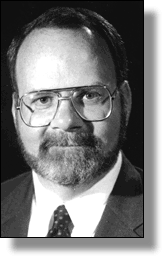
Dean Timothy J. Flanagan, 1991-98.
“The establishment of the Correctional Management Institute of Texas represented a major extension of the College's long history of outreach to practitioners in operating agencies, and the provision of quality training and professional development programs,” said Dr. Flanagan, who is a Senior Fellow at the American Association of State Colleges and Universities. “The collaboration with colleagues in other disciplines in the development of the doctoral program in Forensic Psychology strengthened the College of Criminal Justice and ended SHSU's status as a single doctorate-granting institution.”
 During his tenure, Dr. Flanagan oversaw an increase in enrollment in the College by 20 percent. As a result, the College began offering a satellite program at the University Center in The Woodlands, a collaborative effort among six higher education institutions in the state. Due to the success of that program, Sam Houston State University opened Sam Houston State University -- The Woodlands Center in 2012 to offer a full array of academic courses for undergraduate and graduate students.
During his tenure, Dr. Flanagan oversaw an increase in enrollment in the College by 20 percent. As a result, the College began offering a satellite program at the University Center in The Woodlands, a collaborative effort among six higher education institutions in the state. Due to the success of that program, Sam Houston State University opened Sam Houston State University -- The Woodlands Center in 2012 to offer a full array of academic courses for undergraduate and graduate students.
To support the new students, Dr. Flanagan garnered six new undergraduate scholarships, many to honor alumni for years of service in the criminal justice field or those killed in the line of duty, as well as three new graduate scholarship through fundraising in the Houston/Harris County business community.
Dr. Flanagan established several new scholarships at the College"“The College's scholarship programs are essential to delivering its programs,” said Dr. Flanagan. “Financial support for students makes high-quality academic programs accessible.”
Dr. Flanagan also established the undergraduate and graduate advisement offices to give specific guidance to students seeking criminal justice degrees. He also helped launched the Clinical Psychology Ph.D. degree, which offers forensic psychology as one of its specialty areas.
At the Center, Dr. Flanagan ushered in the Correctional Management Institute of Texas, which was designed to determine how policies are developed and correctional officers are trained in the state. The College had already served as the site for the Texas Probation Training Academy, but now expanded its mission to include cultural diversity training in the workforce, treatment and supervision of sex offenders, how to handle gangs in institutional settings and management of offenders in community facilities and other correctional settings, according to Fulfilling a Mandate: A History of the Criminal Justice Center at Sam Houston State University by Dr. Mitchel Roth.

A New Chiefs class graduates from LEMIT.In addition to introducing CMIT, the Texas Legislature turned over administration of the Law Enforcement Management Institute of Texas to Sam Houston State University, and the LEMIT center was constructed on campus. The center offered one of the most comprehensive law enforcement management development programs, which rivaled the FBI’s National Academy. The program soon introduced its Leadership Command College, a nine week cooperative program among SHSU, Texas A&M and Texas Woman’s University to develop police leadership for the future.
Through his endeavors, Dr. Flanagan was able to significantly increase the research and sponsored funding to the College during his time as Dean. In 1995, the College commissioned the National Opinion Survey on Crime and Justice, a major study which culminated in a book, Americans View Crime and Justice, which he edited along with Dr.
Dennis Longmire.
 Among these were research projects at LEMIT, a film to prevent suicides in jails, National Institute of Justice grants to study citizen complaints against law enforcement and changes in homicide rates in Houston, and an Environmental Protection Agency grant to reduce the extent of environmental crime in the state.
Among these were research projects at LEMIT, a film to prevent suicides in jails, National Institute of Justice grants to study citizen complaints against law enforcement and changes in homicide rates in Houston, and an Environmental Protection Agency grant to reduce the extent of environmental crime in the state.
“The academic field of criminal justice has grown and broadened dramatically in the past five decades, and SHSU's Criminal Justice Center remains one of the best known crime-related academic centers in the nation,” said Dr. Flanagan. “If the College remains focused on its mission of education and service to the people of the state of Texas, it will prosper as a public university contributing value in many forms in return for the public support it receives.”